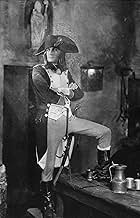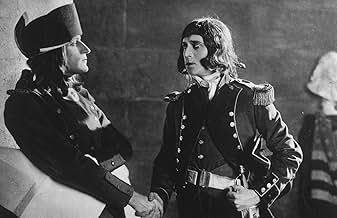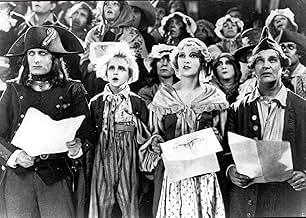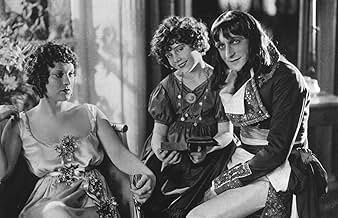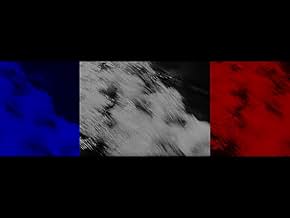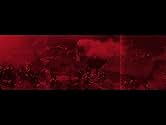IMDb RATING
8.2/10
9.5K
YOUR RATING
A film about the French general's youth and early military career.A film about the French general's youth and early military career.A film about the French general's youth and early military career.
- Awards
- 4 wins total
Nicolas Roudenko
- Napoléon Bonaparte enfant
- (as Vladimir Roudenko)
Max Maxudian
- Barras
- (as Maxudian)
- Director
- Writer
- All cast & crew
- Production, box office & more at IMDbPro
Featured reviews
I had the privilege of seeing the restored version of this film, to the accompaniment of a live orchestra under the baton of Carmine Coppola, in Los Angeles' un-air-conditioned war memorial. Despite uncomfortable seating and terrible heat, the experience of this four hour movie remains a watershed for anyone who attended. To think that because of the invention of sound, this masterpiece was partially destroyed by Abel Gance in a fit of depression, is heartbreaking. More shocking is that Gance's invention of Cinemascope - of which today only the end of the film retains in its triptych screen effect - was lost to filmgoers until its reinvention years later.
Obviously true art can't be hidden forever, and Gance did live to see Napoleon take its rightful place in cinematic history. Though it is many years later, I can still remember the tears and the ovation when the black screen with the white signature, "Abel Gance", signified the end of the film. A compelling and great work of art.
Obviously true art can't be hidden forever, and Gance did live to see Napoleon take its rightful place in cinematic history. Though it is many years later, I can still remember the tears and the ovation when the black screen with the white signature, "Abel Gance", signified the end of the film. A compelling and great work of art.
Modern film-goers are used to explication, to having everything explained for them. The art of visual story-telling -- where images and action indicate the emotional state of characters, rather than have the actor tell you how angry or sad or excited they are -- has almost been lost. But "Napoleon" is a masterpiece of visual art. (Writer-director Abel Gance was honored at the Telluride film festival a few years ago for this film. Far too late, in my opinion.)
The film tells the life of Napoleon Bonaparte -- the Corsican who adopts France as his homeland, rises to supreme general of the French armies during the Revolution and eventually seizes the seat of government itself (twice!). It starts out with a lengthy (if perhaps mythological) examination of Napoleon's childhood in a Catholic school. Snowball fights between Napoleon and two future foes portend the future. Napoleon's friendship with a pet eagle foreshadows his role as emperor of France. But even though these scenes represent more artistic license than history, they are tremendously well-acted by the young Vladimir Roudenko (as young Napoleon). Among the many innovations are some relatively naturalistic acting by the members of the cast and some jaw-dropping editing and montage sequences (especially during the brawl during the snowball fight and the fight in the sleeping quarters). Such innovative use of editing probably wouldn't be seen for another 30 or 40 years!
After almost an hour of this three-hour epic, we're transported to the period of the adult Napoleon -- acted with gravitas and iciness by Albert Dieudonne (who is among the cast's taller actors, just as Napoleon was in reality fairly tall, too). The film dwells extensively on the formative period when Napoleon first arrives in Paris during the late Revolution, focusing heavily on how the chaos in the city stamped into Napoleon the authoritarianism and dictatorial leadership traits that would emerge later in life. This is perhaps the highlight of the film. The editing and visual images create a swirling, spinning, mind-blowing effect that is extremely effective.
The film then focuses on Napoleon's return to Corisca -- whose people held allegiances to Spain and Italy as well as France, and where Napoleon faced imprisonment due to his French leanings. For anyone interested in learning more about the life of Napoleon, this segment is pretty eye-opening. It's followed by a sequence at sea that's amazingly effective in conveying the power and terror of a storm at sea. For its time, this film contained some powerful ocean footage (watch for those amazing low-angle shots, and the ingenious intercutting of the "angry storm" of the French assembly and Napoleon's tiny skiff tossed about on the stormy seas).
The final hour and a half of the film depicts Napoleon's rise in the army and his tenure as emperor of France. This is perhaps the portion of the film that most viewers would think of as "the story of Napoleon." But perhaps one of the reasons why this film is so fascinating is that it delves deeply into the formative episodes in Napoleon's early life and gives as much importance to them as to his later actions on the battlefield in Italy, his tenure as emperor, and his subsequent exile, return, and exile. And the film does so without being heavy-handed, un-subtle or overly expositive.
A restored version of "Napoleon" is making the rounds in the US in cinemas and on television. It contains a new musical soundtrack by Carmine Coppola, which is fairly good (although at times repetitive and too loud). The film was restored and re-edited by Francis Ford Coppola's Zoetrope studio. Zoetrope added some tinting (the ocean scenes are all blue, the "angry mob" scenes are all red) that is interesting but perhaps not quite the "restoration" some viewers might have had in mind.
Watch "Napoleon." You'll be very surprised at how modern the film is. Compared to other silent films of the 1920s, with the undercranked action, overly emotive acting, fantastic plots and theatrical make-up and costumes, "Napoleon" is years ahead of its time. Silent films require concentration to watch. "Napoleon" will keep your interest.
The film tells the life of Napoleon Bonaparte -- the Corsican who adopts France as his homeland, rises to supreme general of the French armies during the Revolution and eventually seizes the seat of government itself (twice!). It starts out with a lengthy (if perhaps mythological) examination of Napoleon's childhood in a Catholic school. Snowball fights between Napoleon and two future foes portend the future. Napoleon's friendship with a pet eagle foreshadows his role as emperor of France. But even though these scenes represent more artistic license than history, they are tremendously well-acted by the young Vladimir Roudenko (as young Napoleon). Among the many innovations are some relatively naturalistic acting by the members of the cast and some jaw-dropping editing and montage sequences (especially during the brawl during the snowball fight and the fight in the sleeping quarters). Such innovative use of editing probably wouldn't be seen for another 30 or 40 years!
After almost an hour of this three-hour epic, we're transported to the period of the adult Napoleon -- acted with gravitas and iciness by Albert Dieudonne (who is among the cast's taller actors, just as Napoleon was in reality fairly tall, too). The film dwells extensively on the formative period when Napoleon first arrives in Paris during the late Revolution, focusing heavily on how the chaos in the city stamped into Napoleon the authoritarianism and dictatorial leadership traits that would emerge later in life. This is perhaps the highlight of the film. The editing and visual images create a swirling, spinning, mind-blowing effect that is extremely effective.
The film then focuses on Napoleon's return to Corisca -- whose people held allegiances to Spain and Italy as well as France, and where Napoleon faced imprisonment due to his French leanings. For anyone interested in learning more about the life of Napoleon, this segment is pretty eye-opening. It's followed by a sequence at sea that's amazingly effective in conveying the power and terror of a storm at sea. For its time, this film contained some powerful ocean footage (watch for those amazing low-angle shots, and the ingenious intercutting of the "angry storm" of the French assembly and Napoleon's tiny skiff tossed about on the stormy seas).
The final hour and a half of the film depicts Napoleon's rise in the army and his tenure as emperor of France. This is perhaps the portion of the film that most viewers would think of as "the story of Napoleon." But perhaps one of the reasons why this film is so fascinating is that it delves deeply into the formative episodes in Napoleon's early life and gives as much importance to them as to his later actions on the battlefield in Italy, his tenure as emperor, and his subsequent exile, return, and exile. And the film does so without being heavy-handed, un-subtle or overly expositive.
A restored version of "Napoleon" is making the rounds in the US in cinemas and on television. It contains a new musical soundtrack by Carmine Coppola, which is fairly good (although at times repetitive and too loud). The film was restored and re-edited by Francis Ford Coppola's Zoetrope studio. Zoetrope added some tinting (the ocean scenes are all blue, the "angry mob" scenes are all red) that is interesting but perhaps not quite the "restoration" some viewers might have had in mind.
Watch "Napoleon." You'll be very surprised at how modern the film is. Compared to other silent films of the 1920s, with the undercranked action, overly emotive acting, fantastic plots and theatrical make-up and costumes, "Napoleon" is years ahead of its time. Silent films require concentration to watch. "Napoleon" will keep your interest.
Four showings at the art deco palace Paramount Theatre in downtown Oakland on March 24, 25, 31 and April 1 will be a landmark for cinemaphiles. From the opening snowball fight to the closing triptych of the eagle's shadow leading the Grande Armee, there was so much to love. Abel Gance takes you on a journey that your mind gets to ride with distinct pleasures. Robespierre in the John Lennonesque sunglasses, the teaching of the Marsailles, the dinghy with an escaping Napoleon and the General Assembly simultaneously in stormy seas, are but a few. I can't imagine I'll ever watch this on DVD after seeing it like I did. I certainly could never consider a sped up 24pp version. I watched Metropolis once like that and it just wasn't the same film. In fact criminal. So weirdly, I recommend the film but can't recommend seeing it unless a better format is available. I'm going to buy Carl Davis' score and play the film in my head from memory, which includes the crowd at the Paramount rising to their feet at the close shouting Vive La France! Vive La Gance!
At the weekend i went to see Napoleon at the Royal Festival Hall in London. I am a relative newcomer to silent moves but too see a 5 and a half hour performance with the London Philarmonic Orchestra was incredible. Loved it, there seems to be some dispute with Coppola about the rights to this production, but if it is ever done again, it is something that any serious movie goer should make an attempt to see. And to prevent others from seeing this with an orchestra would be a travesty. The music by Carl Davies added another dimension to what was a fantastic film. It would appear that the work is a lifes work for Kevin Brownlow, he should be very proud of this acheivements.
I saw this back in '81 or '82, on the Big Screen at the Shrine Auditorium in Los Angeles, with Carmine Coppola conducting a live orchestra -- there has never been anything like that in all my movie-going experience! The closest that's come since was _Intolerance_, restored, with another live orchestra performing under the baton of the composer, Gillian Anderson (no, not the one from the X-Files). That, too, was an occasion to remember ... but where is Napoleon on DVD?
As many other reviewers have said, Napoleon was a relevatory experience. Certainly, other films to that point had used most of the devices Gance employed so brilliantly (except, of course, his three-screen-wide "Polyvision"), but then sound came in and the requirements of the microphone killed the recently mobilized camera. The camera became very static for at least the next ten years of films -- dynamic camera movements only returned when sound mixing came in to being, and scenes could be shot MOS (mit out sound), with foley and overdubbing replacing the missed sounds.
For this reason, Napoleon is important to see -- as a technical achievement. But Gance's artistry wasn't limited to gimmicks. His pacing, editing, and direction of the actors (including Dieudonne as Nappy -- looking amazingly Rod-Stewart-like) is excellent as well.
Highly recommended -- and when the DVD comes out -- hopefully, with the fuller, five-hour restoration, and Coppola's music on one track, with a reconstruction of the original music on another (and perhaps Gillian Anderson has a score of her own to share?) -- you'll owe it to yourself, as a student of Film, to see it, over and over again.
As many other reviewers have said, Napoleon was a relevatory experience. Certainly, other films to that point had used most of the devices Gance employed so brilliantly (except, of course, his three-screen-wide "Polyvision"), but then sound came in and the requirements of the microphone killed the recently mobilized camera. The camera became very static for at least the next ten years of films -- dynamic camera movements only returned when sound mixing came in to being, and scenes could be shot MOS (mit out sound), with foley and overdubbing replacing the missed sounds.
For this reason, Napoleon is important to see -- as a technical achievement. But Gance's artistry wasn't limited to gimmicks. His pacing, editing, and direction of the actors (including Dieudonne as Nappy -- looking amazingly Rod-Stewart-like) is excellent as well.
Highly recommended -- and when the DVD comes out -- hopefully, with the fuller, five-hour restoration, and Coppola's music on one track, with a reconstruction of the original music on another (and perhaps Gillian Anderson has a score of her own to share?) -- you'll owe it to yourself, as a student of Film, to see it, over and over again.
Did you know
- TriviaAbel Gance remembered one scene that was removed by the censors--that of the execution of civilians by soldiers. The camera is used like a bullet, zooming towards one human target, then another, then another. The sequence is lost, although a still photograph does survive.
- GoofsJunoit makes a comment about not needing sand when an artillery shell dumps soil on the sign he is painting. This is based on an actual incident, but Junot was writing a letter for Napoleon not painting a sign.
- Alternate versionsThere are apparently at least 19 different versions of this film, starting with the original 6-hours cut (in a "triptych" format, requiring three projectors on three screens, called Polyvision). It has been shown in various formats and different running times, including a 1934 version re-edited by director Abel Gance and featuring an added soundtrack.
- ConnectionsEdited into Napoléon Bonaparte (1935)
- SoundtracksThe Thrill of Being In Love (Love Theme of Napoleon and Josephine)
Music by Carmine Coppola
Lyrics by Italia Coppola (USA version)
UK version: score by Carl Davis (based largely on works by Beethoven)
- How long is Napoleon?Powered by Alexa
Details
Box office
- Budget
- FRF 20,000,000 (estimated)
- Gross worldwide
- $39,448
- Runtime5 hours 30 minutes
- Color
- Sound mix
- Aspect ratio
- 1.33 : 1
Contribute to this page
Suggest an edit or add missing content



